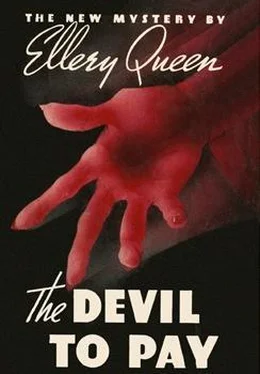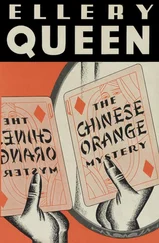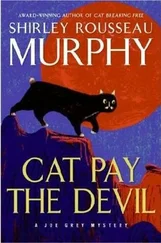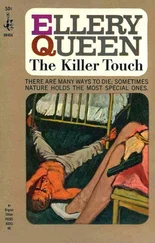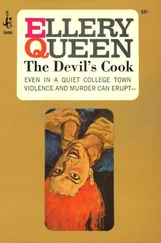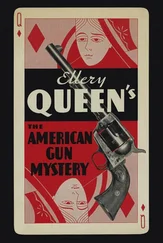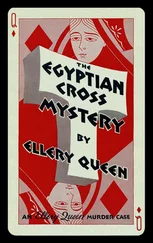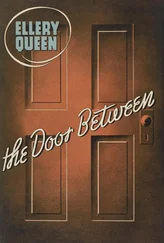“Cross my heart and hope to die a pulp-writer,” said Ellery. “But suppose it’s true? He could merely have been late for the appointment.”
“Let’s hope not,” said Val grimly. “Come on — it isn’t far to his office.”
They made their way past the fringe of Chinatown into the business district, and after a while Ellery said in a pleasant voice: “Don’t be alarmed, but we’re being followed.”
“Oh,” said Val. “A big black sedan?”
Ellery raised his brows. “I didn’t think you’d noticed. All the earmarks, incidentally, of a police car.”
“So that’s what it is! It followed me all morning.”
“Hmm. And that’s not all.”
“What do you mean?”
“No, no, don’t look around. There’s some one else, too. A man — I’ve caught a blurred glimpse or two. Not enough for identification. He’s on our trail like a buzzard.”
“What’ll we do?” asked Val in panic.
“Keep right on ambling along,” said Ellery with a broad smile. “I hardly think he’ll attempt assassination with all these potential witnesses around.”
Val walked stiffly after that, glad that she had given in to Fitzgerald, glad that Hilary “Scoop” King, leading citizen of Evansville, was by her side. When they reached the Lawyers’ Trust Building she dodged into the lobby with an exhalation of relief. But Mr. King contrived to pause and inspect the street. There was the black sedan, snuffling like a trained seal across the street; but the man on foot was nowhere to be seen. Either he was hiding in a doorway or had given up the chase.
Mr. Ruhig’s office was like himself — small, neat, and deceptively ingenuous. It was apparent that Mr. Ruhig did not believe in pampering his clients with an atmosphere. There was a gaunt, worried-looking girl at the switchboard, several clerks and runners with flinty, unemotional faces, and a wall covered with law books which had an air of being used.
There was no difficulty getting in to see the great man. In fact, he came bustling out of his office to meet them.
“This is a pleasant surprise,” he cried, bobbing and beaming. “Shocking about your father, Miss Jardin. What can I do for you? If it’s advice you want, I’m completely at your service, although I’m not in the criminal end. Gratis, of course. I feel like an old friend of the family.”
And all the while he eyed Ellery with a puzzled, unobtrusive interest.
“Mr. Ruhig, Mr. King,” said Val crisply, sitting down in the plain office. “I hope you don’t mind Mr. King’s being with me, Mr. Ruhig. He’s an old college chum who’s volunteered to help.”
“Not at all, not at all. What are friends for?” beamed Mr. Ruhig. Apparently the Joseph’s coat reassured him, for he paid no further attention to Mr. King.
“I’ll come right to the point,” said Val, who had no intention of doing any such thing. “I’m not here as Rhys Jardin’s daughter but as an employee of the Los Angeles Independent .”
“Well! Since when, Miss Jardin? I must say that’s an unlooked-for development.”
“Since this morning. My father and I need money, and it was the only way I knew of earning a great deal quickly.”
“Fitzgerald,” nodded Ruhig approvingly. “Great character, Fitzgerald. Heart as big as all outdoors. Hasn’t stopped agitating for Mooney’s release in ten years.”
“Now that I’ve got a job, I’ve got to earn my keep. Has anything come up on your end, Mr. Ruhig, that might be construed as news?”
“My end?” smiled the lawyer. “Now that’s putting it professionally, I’ll say that. What would my end be? Oh, you mean the will. Well, of course, I’ve filed it for probate. There are certain unavoidable technicalities to go through before it’s finally probated—”
“I suppose,” said Valerie dryly, “Wicious Winni is simply prostrated with grief over the necessity of taking that fifty million dollars.”
Ruhig clucked. “I should resent that remark, Miss Jardin.”
“Why should you?”
“I mean the — ah — disparaging references to Miss Moon.” He clasped his hands over his little belly and smiled suddenly. “I’ll tell you what I’ll do. Suppose I start your newspaper career off with a bang, eh? Then you’ll feel a little more charitable towards Anatole Ruhig.”
Mr. King lounged in his chair studying Mr. Ruhig. Beneath that bland exterior he fancied he saw a considerable equipment for sculduggery. No, Mr. Ruhig was not doing anything out of pure kindness of heart.
“I was going,” went on the lawyer paternally, “to call in the press this afternoon and make a general announcement, but since you’re here I’ll give you an exclusive story. That ought to put you in solid with Fitzgerald! You know,” he coughed and paused to take a drink of water from the chipped bronze carafe on his desk, “Miss Moon on the death of Solly Spaeth lost a dear friend — a dear friend. One of the few friends she had in the world. A dear friend.”
“That,” said Val, “is putting it mildly.”
“Now I’ve always admired Miss Moon from afar, as you might say — the dry man of the law worshipping at the feet of unattainable beauty, ha-ha! But with Spaeth’s death attainment, so to speak, becomes possible. I’m afraid I’ve taken advantage of dear Winni’s grief-stricken condition.” He coughed again. “In a word, Miss Moon has consented to be my wife.”
Val, torn between astonishment and nausea, sat silent. Spaeth not even buried, and that horrible creature already accepting the advances of another man!
“If I were you, Val darling,” said Mr. King in an old-college-chummy way, “I’d pick up that telephone and relate this momentous intelligence to your editor.”
“Didn’t I tell you it was news?” beamed Ruhig.
“Yes, yes,” said Val breathlessly. “May I use your ’phone? When are you going to be married? I mean—”
A cloud passed over Mr. Ruhig’s rubicund features. “Obviously there is a certain decorum that must be preserved. We haven’t thought of a — ah — a date. It will not even be a formal engagement. Merely — what shall I say? — an understanding. By all means use the ’phone.”
Mr. King ruminated while Val seized the instrument. Such a public announcement now would hardly endear Mr. Ruhig, already disliked, to a citizenry whose money Mr. Ruhig was proposing to marry. Obviously, then, Mr. Ruhig in making it had an important object in mind. What?
“Oh, damn,” said Val into the telephone. “Fitz isn’t in now. Give me...” She bit her lip. “Give me Walter Spaeth!.. Walter? Val... No... Now, please. I’ve called Fitz but he isn’t in, and you’re the only other one... It’s a story... Yes! Anatole Ruhig has just told me confidentially he and Winni Moon are going to be married, date uncertain... Walter!” She jiggled the telephone, but Walter had hung up.
Mr. Ruhig breathed on his fingernails. “And now—” he said in the tone of a man who would like to prolong a delightful conversation but must regretfully terminate it.
Val sat down again. “There’s something else.”
“Something else?”
“I’m sort of checking up the day of the murder.”
“Monday? Yes?”
“Did you say,” asked Val, leaning forward, “that you got to Sans Souci a little past six Monday?”
Mr. Ruhig looked astonished. “My dear child! Certainly.”
He was going to deny it. He had to deny it. Or perhaps it all wasn’t true. Val inhaled like a diver and took the plunge. “What time did Spaeth set for your appointment with him?”
“Between five and five-thirty,” said Mr. Ruhig instantly.
Ellery, quietly watching, felt a backwash of admiration. No hesitation at all. Between five and five-thirty. Just like that.
Читать дальше
